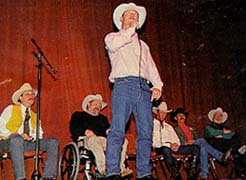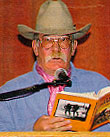 the day there are four poetry sessions running simultaneously, on
themes like "The Cowboy Love," "Ranch Women" and "The Cowboy Code." At
night, all the performances are sold out, and every guest ranch and
fleabag motel is booked a year in advance.
the day there are four poetry sessions running simultaneously, on
themes like "The Cowboy Love," "Ranch Women" and "The Cowboy Code." At
night, all the performances are sold out, and every guest ranch and
fleabag motel is booked a year in advance.
The Auditorium is packed with ranchers and cowboys, wearing Stetsons, pink-and-purple shirts, rodeo belts and high-heeled boots with lightning bolts. They fall silent as Paul Zarzyski walks on stage. Zarzyski -- "rhymes with whisky," he writes in one of his poems -- has brown eyes, a dark mustache and teeth that are slightly irregular. He hooks his thumbs in the pockets of his jeans, thrusts his hips forward and begins to recite "The Bucking Horse Moon":
A kiss for luck then we'd let 'er buck -- I'd spur electric on adrenaline and lust. She'd figure-8 those barrels on her Crimson Missile sorrel we'd make the night air swirl with hair and dust.
When he finishes, people cheer and wave their hats. They have driven through snow and windstorms to attend the Cowboy Poetry Gathering, a yearly festival that takes place during the last week in January in Elko, Nev., an isolated town 250 miles east of Reno. This year, the gathering is expected to draw 10,000 people.
For four days and nights, no one seems to sleep. They troop
from poetry readings to workshops and concerts and out to the
bars, and then to an all-night party at a cattlemen's hotel. During
 the day there are four poetry sessions running simultaneously, on
themes like "The Cowboy Love," "Ranch Women" and "The Cowboy Code." At
night, all the performances are sold out, and every guest ranch and
fleabag motel is booked a year in advance.
the day there are four poetry sessions running simultaneously, on
themes like "The Cowboy Love," "Ranch Women" and "The Cowboy Code." At
night, all the performances are sold out, and every guest ranch and
fleabag motel is booked a year in advance.
At a time when academic poetry finds its audience shrinking and its relevance in question, cowboy poetry is exploding partly because it's accessible and light-hearted, but also because it celebrates a way of life that has a mythic hold on the national imagination.
I don't believe, for example, that I would have traveled five hours to attend a festival of stockbroker poetry. But "cowboy poet" -- the very words are seductive, suggesting the unlikely and irresistible marriage of the macho with the artistic.
From the first day in Elko, I was charmed. While much of the poetry was simplistic and forgettable, I heard numerous poems that were witty and profound. But it was not the poetry alone that kept me in Elko for four days. I was caught up by the expansive spirit of the gathering where ranchers come together to share their love of stories and words. I was given, for a brief time, immersion in a culture in which people still spend their day on horseback and feel as a Montana poet, Wallace McRae, told me, "I live in the greatest place and do the greatest work you can do."
In the Lobby of the Elko Convention Center, Waddie Mitchell is
autographing books for a long line of fans. He is the quintessential
 cowboy poet: tall and Ianky, with lively blue eyes and a handlebar
mustache. His laconic manner has endeared him to audiences on the
"Tonight" show, at the Rainbow Room and the Library of Congress, where he
has read such poems as "What Will I Tell Him?":
cowboy poet: tall and Ianky, with lively blue eyes and a handlebar
mustache. His laconic manner has endeared him to audiences on the
"Tonight" show, at the Rainbow Room and the Library of Congress, where he
has read such poems as "What Will I Tell Him?":
What will I tell him, you ask me, When my son's trying to make up his mind? To ride for a Iiving like I have, Or explore what the world has to find? I'll tell him the truth as I know it -- Of good years, hard winters and drought ... That adrenaline rush when you're bustin' up brush On a cowpony, agile and stout
Mitchell first heard cowboy poetry growing up on a ranch near Jiggs, Nev. "Jiggs consists of a school that has 11 kids in it, a dance hall and a bar," he says. "What more do you need?" When Mitchell was 14, he was allowed to start hanging out with cowboys in the bunkhouse. There was no electricity, no radio or television, so at night, they would tell stories and recite poems. "I suppose that's where the whole tradition of cowboy poetry began -- around the campfire at lonely outposts," he says. "I found that if you tried to tell a story more than once, people would say, 'I've already heard that.' But if you set it to rhyme, people would listen again and again, the way they listen to a favorite song."
Mitchell quit school at 17 to become a buckaroo. His father sent him a set of Harvard Classics for for Christmas, and "out of sheer boredom, I started reading them." He also started writing poems. In 1985, a folklorist friend named Hal Cannon invited Mitchell to the first Poetry Gathering in Elko. The two men were setting out chairs for the first session when Mitchell said, "Who're we kidding? We'll never fill 100 chairs." But more than 1,000 showed up.
That first year, only 6 of the 28 featured poets were women. There was simply no tradition of cowgirl poetry, says Teresa Jordan, who has edited collection of ranch women's verse called "Graining the Mare." "Women did not recite ballads to each other over coffee, or on the long rides to distant pastures," she says. But in recent years, there has been a surge of poetry written by ranch women. At last year's festival, an all-female performance called "Real Women Buck Bales" was among the hottest tickets. The women's poems tend to be more raw and intimate, like Linda Hasselstrom's "Beef Eater" (below).
The Elko Gathering has grown in every respect, sparking a renewal of passion for cowboy poetry, at a time when the number of actual cowboys continues to dwindle.
In 1994, there were more than 150 cowboy poetry festivals around the country, along with an outcrop of magazines, CD's and books featuring cowboy verse. Mitchell stopped working as a buckaroo to go on the poetry circuit full time; the odd twists of course, is that the popularity of the work has removed him from the experience. As Zarzyski says, "You come to Elko to celebrate your way of life, but if somebody gives you the opportunity to dump it and make more money being a cowboy star, you take it."
Zarzyski rode bareback broncs for 12 years, during which time he also studied poetry at the University of Montana. He resents it when critics label academic poetry as fine art and cowboy poetry as folk art. "There's cowboy poetry that's folk art and there's cowboy poetry that's fine art," he says, "and it's every damn bit as fine as the stuff published in The New Yorker."
Louis Sampson, who won the Pulitzer Prize for poetry in 1964, disagrees. "I'm sorry, but I have a high opinion of poetry, and anyone who can rhyme cat with mat is not a poet," he says. "Ben Jonson said, 'A rhymer and a poet are two things,' and it's still true. Poetry is a spiritual thing, it has to appeal to the intellect, and it's an art. Guys who get on stage and belt out silly ideas that rhyme -- it's an entertainment, like flagpole sitting. But it's not poetry."
Robert Haas, who teaches American Poetry at Berkeley, went to a cowboy poetry reading in Wyoming. "I was abashed and hugely amused," he says. Haas compares the poems he heard to the popular newspaper poems of the 19th century. "I guess you could say that modernism took poetry away from ordinary people, and cowboy poetry is one way of taking it back."
Zarzyski wonders why there must be a squaring-off between "the literati and the lariati." If cowboy poetry is making people fall in love with the sound of words, he says, "the jump and kick of poetry lines, then we should all be tipping our hats to it, whether it's a cowboy hat or a fedora or whatever hat they wear in the far, far East. Because poetry is at the bottom of the barrel in this country It's right down there with mime."
On the last day of the festival, there are 35 poetry readings, two concerts and, topping off the week, like icing on a cake, the Ian Tyson dance.
Ian Tyson was a well-known folk singer in the 1960's, half of the duo Ian and Sylvia. He eventually returned to western Canada, where he had grown up, to raise cutting horses and write cowboy music. Tyson is 61 now, striking, elegant and lean, with a remarkable voice -- honey-golden, laced with sadness. Backstage, I ask if he's seen a rising interest in cowboy music. "It's mostly me," he says. "I'm the Charlie Parker of cowboy music." His friends burst out laughing.
At 1 AM., when the dance ends, everyone meets in an upstairs room at Stockmen's Motor Hotel, where cowboys drink, sing, play guitars, recite poetry and perform rope tricks. At 6 in the morning, a group of us head to the coffee shop for breakfast. Every seat is taken.
"I'm torn," says one young man at a crowded table. "I want to tell my friends back home about this, but I'm afraid everyone will come."
"It's too late," answers Vess Quinlan, a poet from Colorado. "Everyone did come."
From "The Cowboy Poetry Gathering" by Baxter Black I went to the first annual ever convention of cowboy bards. (I woulda said poets, but poet's a word that sure makes a rhymer's job hard.)... They had come from the ranches and cowtowns, their poetry burstin' their brains And any poor fool on a corner or stool was subjected to endless refrains.
From "Beef Eater" by Linda HasselstromI have been eating beef hearts all my life. I split the smooth maroon shape lengthwise, open it like a diagram, chambers exposed. I cut tough white membranes off valves, slice onions over the the heart, float it in water, boil it tender .... I pack the crevices full, nail the heart together, weave string around the nails ....
From "Reincarnation" by Wallace McRae "What does reincarnation mean?" A cowpoke ast his friend. His pal replied, "It happens when Yer life has reached its end. They comb yer hair, and warsh yer neck, And clean yer fingernails, And lay you in a padded box Away from life's travails. The box and you goes in a hole, That's been dug into the ground. Reincarnation starts in when Yore planted 'neath a mound. Them clods melt down, just like yer box, And you who is inside. And then yore just beginnin' on Yer transformation ride."
Document URL: http://www.english.upenn.edu/~afilreis/88/cowboy-poets.html
Last modified: Wednesday, 18-Jul-2007 16:25:25 EDT